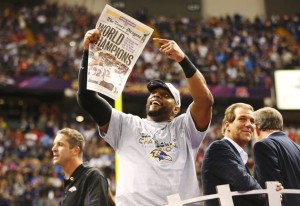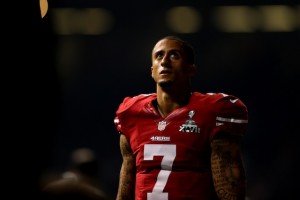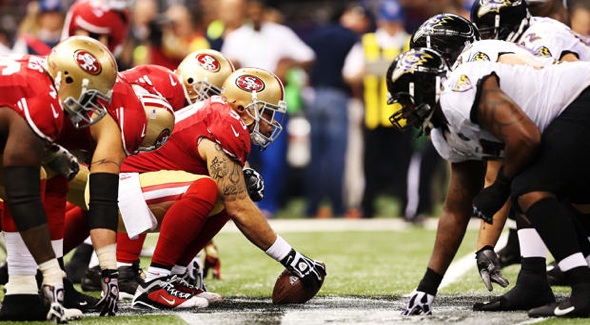Read the morning-after headlines from Super Bowl XLVII and you’ll get a sense for the inevitable story that played out in New Orleans – of destiny being fulfilled.
The Baltimore Ravens’ defense, pushed around for most of the second half Sunday, made a stop when it mattered most. Ray Lewis is going out a Super Bowl champion. – NFL.com
En route to winning the MVP trophy, Flacco completed 22 of 33 passes for 287 yards and three touchdowns — all in the first half. He became the sixth player to join one of the NFL’s most exclusive fraternities: active quarterbacks who have been a Super Bowl MVP. – SI.com
In the end it was the aged, but still game Ravens defense that delivered one final goal-line stand to clinch victory. A fourth-down pass from Niners quarterback Colin Kaepernick sailed long with 1:46 to play, allowing Baltimore to hold on. – Yahoo.com

Destiny? Or perhaps the child of same?
The headlines, the lead grafs, and the narrative are all familiar enough that our eyes pass over them without stopping. But anyone who knows the conventions of football – or any pro sport – knows that the game wasn’t destined to turn out that way. Especially this Super Bowl.
A quick look at Football Outsiders tells us that San Francisco had the better DVOA (Defense-adjusted Value over Average) in the overall game. DVOA is Football Outsiders’ metric of, briefly, yards gained, weighted by how useful the yardage is (five yards on 3rd-and-2 are worth more than five yards on 3rd-and-15) and how competitive the opponent is. San Francisco played consistently better; DVOA is a stronger measure of consistency than anything else. But Baltimore produced more big plays – consider Flacco’s desperation toss that Boldin turned into a reception, or Jacoby Jones’ 108-yd kickoff return – that defied the odds.
This is OTI, not KUBIAK, so the virtues and flaws of various metrics aren’t what’s at stake here. The point is that, if we’re honest with ourselves, we can visualize a Monday morning where certain plays that went one way went the other way. This particular Super Bowl – with a fake field goal, a power outage, three TDs in less than five minutes by a team on the comeback, and a deliberate safety – makes it easier than usual to visualize.
After the first thirty-one minutes of play, fans may have been ready to turn the lights out on the 49ers. And for a moment, it looked like the Superdome might accommodate them. But Colin Kaepernick wasn’t going gentle into that good night. – NFL.com
They called themselves the “team of destiny.” Sadly, destiny had another favorite in mind. – SI.com
The Ravens’ famous “bend but don’t break” defense bent just a little too far in the second half, allowing Frank Gore to march into the end zone three times, overcoming a substantial first half deficit to bring the Lombardi Trophy to San Francisco. – Yahoo.com
Sounds plausible, right? Frighteningly so. So what does this tell us about sports narratives?
Not counting the rare tie, the outcome of a sporting event can only go one way or the other. A football game – especially a playoff game – has to end in a W for one team and an L for the other. Each team puts at least 60 plays in motion during the 60 minutes of regulation play, and has to respond to at least 60 from the other team. Each of these plays, like the random walk of a stock’s price, has a chance to increment or decrement a team’s overall chance of winning. But, when the closing bell sounds, a stock that’s worth $31/share is still worth $31/share (even if it was worth $36 that morning). Its value has diminished but not vanished. A football team that scores 31 points, however, is valueless if the other team scored 34.
The outcome of a championship game is binary, like a light switched on or off, and our natural inclination is to cast every play of that game in a corresponding shade. So the Baltimore defense stopping the 49ers on the goal line in the last minutes of the 4th quarter is a “final goal-line stand to clinch victory” because the Ravens won. Had the Ravens lost, it would be, perhaps, “the final misstep in a second half filled with missed opportunities.” Ed Reed’s interception in the first half was key to driving up Baltimore’s lead. Had the 49ers won, however, it would have been “fuel in the fire in Kaepernick’s eyes,” driving him on a righteous comeback.
Two games, with an almost identical list of plays. Two stories, with an almost identical list of scenes and chapters. But with two polar opposite outcomes.

Darkness on the edge of his goatee.
When a narrative unfolds, we want it to turn out a certain way. We’re never positive of the specifics of the plot – nor should we be, else why listen to the tale? – but we come with expectations. The conventions of certain narratives are so ingrained into Western culture that we recognize a heroic journey in whatever form it appears. We may not know how Luke is going to stop Darth Vader, or how Frodo is going to make it all the way to Mordor, but we know that the forces of darkness won’t have the final victory. We know that our hero passes through trials in order to be strengthened, not broken.
Of course, Campbell’s monomyth is not the only universal narrative. Robert Heinlein (as quoted by Neil Gaiman) said there were only three types of stories: Boy Meets Girl (meaning, romance); A Brave Little Tailor (meaning, adventure); A Man Learns a Lesson (meaning, morality tale). Gaiman pointed out that inverting all these – boy loses girl, etc. – give you tragedies, for a total of six. Georges Polti, on the other hand, came up with thirty-six dramatic situations, from the common (“Pursuit,” “Daring Enterprise”) to the exotic (“Slayer of kin unrecognized”; “Conflict with a god”). Whichever list you choose, the fact that we can narrow down the varieties of dramatic circumstance to a digestible list shows that there are only a finite number of narratives that Westerners can recognize.
Imagine the dissatisfaction that would come with opening a new story, only to find that the contents were the opposite of what you expected. How would you react if you showed up for an over-the-top action comedy, only to find an absurd satire on British rural life? (Taking nothing away from Hot Fuzz, I still say its trailer was a little misleading) If we recognize the elements of a familiar narrative, we expect the narrative to resolve in a familiar way.
Sports narratives – the overarching themes that fans and writers assign to the outcome of a sporting event – don’t work the same way. A game can play out in a predictable fashion all the way to the last few plays, and then turn around so abruptly as to shatter any sense of logic. And yet the pattern recognition embedded in every human mind compels us to find a narrative. So we dust off one of the old sporting tropes – the Underdog Triumphing, the Last Hurrah, the Ode to an Athlete Dying Young – and fashion the events of the last four periods to fit it.
No reputable artist would tell any other sort of story in this way. Imagine Shakespeare deciding that As You Like It would be a tragedy and simply making a few Act Five changes – the usurping Duke kills Rosalind before she unmasks, leading Orlando to kill the Duke, leading Celia to kill Orlando – to make an unhappy ending. No one would stand for it! A tragedy (in Shakespeare’s day, and to some extent in ours too) requires sobriety, people of great stature, and reversal of fortune caused by a tragic misstep. You can’t make a tragedy by tacking a sad ending onto an otherwise comical piece. But you can make a tragedy by tacking a failed goal line drive onto an otherwise impressive second half comeback, at least for San Francisco fans.
Why do sports narratives get away with this backward reckoning? Because they’re true events. All attempts to pin a narrative onto history have to fudge the truth, or at least smear it while setting it down. As sports fans, we have to believe that everything happened for a reason, and “a series of unpredictable events unfolded in such a way as to favor one team over another” isn’t sufficient. So we settle for a reason that makes sense of the highlights, such as “Frank Gore is a dominant running back” or “Ray Lewis inspired his teammates to greatness.” Either of those could still be true, no matter what the game’s outcome – Frank Gore put up 110 yards rushing and a touchdown, more than any other runner on either team – but the win gives weight to that reason over others. Why must this story be the true one? Because the team that this story favors was the winning team.
Sports narrative, and really all forms of enjoying sports, are an attempt to make sense of otherwise random occurrences. We tell stories about aggressive young quarterbacks, or aging linebackers suiting up for one last ride, because we recognize stories more than static. And since a sensible universe is preferable to a random one, we stick with the story, even when the narrative turns against us. But it’s worth remembering – especially if you were rooting for San Francisco this past Sunday – that the weight of inevitability that a narrative gives to a sporting event is an illusion, not a fact. Nothing is for certain until the clock runs out. That, as they say, is why you play the game.


As a person who follows sports pretty minimally, I find the most narrative-ly interesting aspect of this Super Bowl to be the blackout. I know you already touched on it a bit on the podcast, and it can be hard to Overthink something that was unintentional and true (as opposed to a fiction crafted to suggest certain ideas) – but I’d like to see a really OTI – level analysis of the cultural impact of infrastructure failure during the year’s largest televised event.
Bill Barnwell, excellent football writer at Grantland, has been on this beat all playoffs long (and maybe earlier in the season?). Here’s his Super Bowl recap: http://www.grantland.com/story/_/id/8912868/bill-barnwell-puts-ravens-win-perspective
Fun fact: it’s so easy to turn sports stats into a cohesive narrative that up to 50% of stories written on many if the largest sports news sites are generated by computer algorithms.